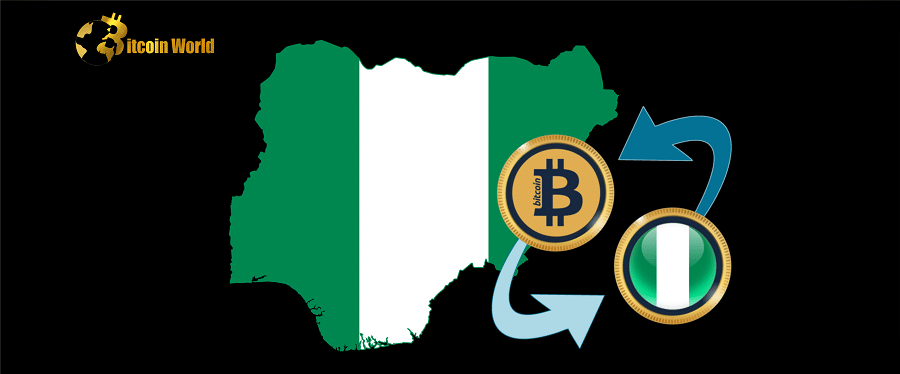Ever wondered why the price of Bitcoin seems to have a mind of its own depending on where you are in the world? Well, in Nigeria, the cryptocurrency scene is buzzing with a unique phenomenon: a significant Bitcoin premium. Imagine Bitcoin trading at around $23,700 globally, and then picture it fetching a staggering $38,000 in Nigeria! That’s not just a slight bump; we’re talking about a price leap that’s got everyone in the crypto world talking. Let’s dive into why Nigerians are paying a premium for their Bitcoin and what’s fueling this crypto frenzy.
Bitcoin in Nigeria: A Price Anomaly?
Yes, you read that right. As of recent reports, one Bitcoin (BTC) could set you back a cool 17.8 million Naira on Nigerian crypto exchanges like NairaEX. Sources indicate this translates to roughly $38,792. When you compare this to the global market price of around $23,700, it’s clear there’s a substantial premium at play – exceeding a whopping 60%! This price surge isn’t just random market fluctuation; it’s deeply rooted in the country’s current economic and policy landscape.
What’s Driving the Bitcoin Premium in Nigeria?
The primary catalyst behind this Bitcoin price surge in Nigeria points directly to the Central Bank of Nigeria’s (CBN) policies. The CBN is actively pushing for a cashless economy, and recent measures to limit cash withdrawals are playing a significant role. Let’s break down the key factors:
- Cash Withdrawal Limits: Starting January, the CBN implemented strict limits on ATM cash withdrawals. Individuals are capped at 20,000 NGN (approximately $43.50) per day from ATMs, with a maximum of 100,000 NGN (around $217) daily overall. This move drastically reduces the availability of Naira in physical form.
- New Naira Notes and Currency Swap: To combat inflation and money laundering, the CBN introduced new Naira banknotes. Citizens were initially given a deadline to swap their old larger denomination notes for the new currency. While this deadline was initially set for January 24th, it was later extended to February 10th due to long queues and public outcry about insufficient time for the swap. This currency swap created a temporary scarcity of Naira, further pushing people towards digital alternatives.
- Desire for Digital Alternatives: With limited cash access and the Naira swap chaos, Nigerians are increasingly looking towards digital currencies like Bitcoin as a store of value and a means of transaction. Bitcoin, being decentralized and outside the direct control of the CBN, becomes an attractive alternative during periods of financial uncertainty and currency transition.
- Past Crypto Restrictions: It’s worth noting that this isn’t Nigeria’s first rodeo with Bitcoin premiums. Back in February 2021, when the CBN prohibited licensed financial institutions from serving cryptocurrency exchanges, a significant BTC premium of up to 36% emerged. This history of regulatory uncertainty and restrictions on crypto has likely contributed to the current market dynamics.
Bitcoin as a Safe Haven?
In essence, the Bitcoin premium in Nigeria can be viewed as a reflection of increased demand coupled with constrained supply within the local market. When traditional financial avenues are restricted, and people seek alternatives to preserve their wealth or conduct transactions, Bitcoin steps in as a viable option. This situation highlights Bitcoin’s potential role as a ‘safe haven’ asset in economies facing currency challenges or policy-driven limitations.
Nigeria’s Crypto Interest is Skyrocketing!
It’s no surprise that interest in Bitcoin in Nigeria is booming. Google Trends data reveals Nigeria consistently ranks as the top country globally for Bitcoin web searches. This surge in online interest underscores the growing adoption and curiosity surrounding cryptocurrencies in the nation.
The AfriGo Card: A Local Alternative to Global Payment Giants
Adding another layer to Nigeria’s evolving financial landscape, Reuters reported that the CBN has launched a domestic card scheme called “AfriGo.” This initiative aims to provide Nigerians with greater access to bank card services, potentially reducing reliance on international cards like MasterCard and Visa, and avoiding their associated fees. While AfriGo is designed for local transactions, its emergence further emphasizes Nigeria’s push towards greater financial autonomy and innovation within its payment systems.
Key Takeaways: Bitcoin Premium in Nigeria
Let’s recap the key points to understand the Bitcoin premium in Nigeria:
- Significant Price Difference: Bitcoin trades at a substantial premium in Nigeria (over 60% at times) compared to global markets.
- CBN Policies are Key: Central Bank of Nigeria’s cashless policies, particularly cash withdrawal limits and the Naira redesign, are primary drivers.
- Naira Scarcity: Restrictions on cash withdrawals and the currency swap have created a scarcity of Naira, pushing people to digital alternatives.
- Bitcoin as an Alternative: Nigerians are turning to Bitcoin as a store of value and transaction method amidst these financial constraints.
- High Crypto Interest: Nigeria consistently leads in global Bitcoin search interest, reflecting strong local adoption.
- AfriGo Card Introduction: The launch of the domestic AfriGo card signals Nigeria’s move towards greater financial independence and innovation in payment solutions.
Looking Ahead
The Bitcoin premium in Nigeria is a fascinating case study of how macroeconomic policies and local financial conditions can significantly impact cryptocurrency markets. As Nigeria continues its journey towards a cashless economy and navigates currency transitions, the role of Bitcoin and other digital currencies will likely remain prominent. Whether this premium persists long-term will depend on how these policies evolve and how Nigerians adapt to the changing financial landscape. One thing is clear: Nigeria’s crypto story is far from over, and it’s a space worth watching closely!
Disclaimer: The information provided is not trading advice, Bitcoinworld.co.in holds no liability for any investments made based on the information provided on this page. We strongly recommend independent research and/or consultation with a qualified professional before making any investment decisions.


